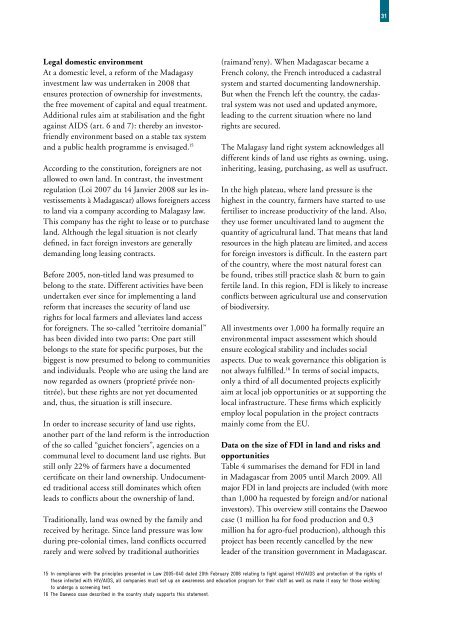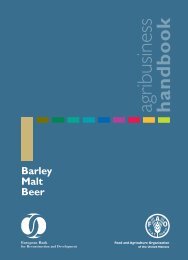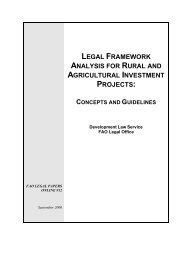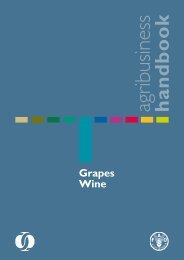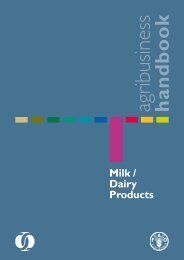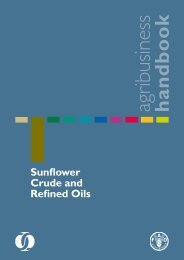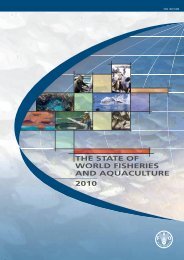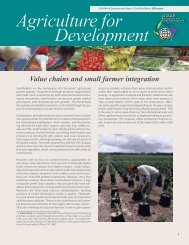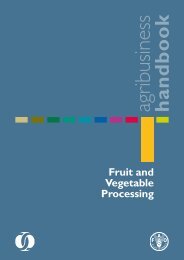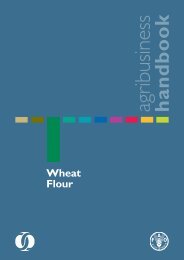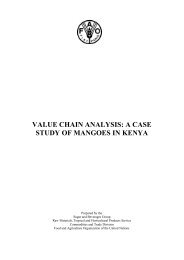Foreign Direct Investment (FDI) in Land in developing countries
Foreign Direct Investment (FDI) in Land in developing countries
Foreign Direct Investment (FDI) in Land in developing countries
- No tags were found...
You also want an ePaper? Increase the reach of your titles
YUMPU automatically turns print PDFs into web optimized ePapers that Google loves.
31Legal domestic environmentAt a domestic level, a reform of the Madagasy<strong>in</strong>vestment law was undertaken <strong>in</strong> 2008 thatensures protection of ownership for <strong>in</strong>vestments,the free movement of capital and equal treatment.Additional rules aim at stabilisation and the fightaga<strong>in</strong>st AIDS (art. 6 and 7): thereby an <strong>in</strong>vestorfriendlyenvironment based on a stable tax systemand a public health programme is envisaged. 15Accord<strong>in</strong>g to the constitution, foreigners are notallowed to own land. In contrast, the <strong>in</strong>vestmentregulation (Loi 2007 du 14 Janvier 2008 sur les <strong>in</strong>vestissementsà Madagascar) allows foreigners accessto land via a company accord<strong>in</strong>g to Malagasy law.This company has the right to lease or to purchaseland. Although the legal situation is not clearlydef<strong>in</strong>ed, <strong>in</strong> fact foreign <strong>in</strong>vestors are generallydemand<strong>in</strong>g long leas<strong>in</strong>g contracts.Before 2005, non-titled land was presumed tobelong to the state. Different activities have beenundertaken ever s<strong>in</strong>ce for implement<strong>in</strong>g a landreform that <strong>in</strong>creases the security of land userights for local farmers and alleviates land accessfor foreigners. The so-called “territoire domanial”has been divided <strong>in</strong>to two parts: One part stillbelongs to the state for specific purposes, but thebiggest is now presumed to belong to communitiesand <strong>in</strong>dividuals. People who are us<strong>in</strong>g the land arenow regarded as owners (proprieté privée nontitrée),but these rights are not yet documentedand, thus, the situation is still <strong>in</strong>secure.In order to <strong>in</strong>crease security of land use rights,another part of the land reform is the <strong>in</strong>troductionof the so called “guichet fonciers”, agencies on acommunal level to document land use rights. Butstill only 22% of farmers have a documentedcertificate on their land ownership. Undocumentedtraditional access still dom<strong>in</strong>ates which oftenleads to conflicts about the ownership of land.Traditionally, land was owned by the family andreceived by heritage. S<strong>in</strong>ce land pressure was lowdur<strong>in</strong>g pre-colonial times, land conflicts occurredrarely and were solved by traditional authorities(raimand’reny). When Madagascar became aFrench colony, the French <strong>in</strong>troduced a cadastralsystem and started document<strong>in</strong>g landownership.But when the French left the country, the cadastralsystem was not used and updated anymore,lead<strong>in</strong>g to the current situation where no landrights are secured.The Malagasy land right system acknowledges alldifferent k<strong>in</strong>ds of land use rights as own<strong>in</strong>g, us<strong>in</strong>g,<strong>in</strong>herit<strong>in</strong>g, leas<strong>in</strong>g, purchas<strong>in</strong>g, as well as usufruct.In the high plateau, where land pressure is thehighest <strong>in</strong> the country, farmers have started to usefertiliser to <strong>in</strong>crease productivity of the land. Also,they use former uncultivated land to augment thequantity of agricultural land. That means that landresources <strong>in</strong> the high plateau are limited, and accessfor foreign <strong>in</strong>vestors is difficult. In the eastern partof the country, where the most natural forest canbe found, tribes still practice slash & burn to ga<strong>in</strong>fertile land. In this region, <strong>FDI</strong> is likely to <strong>in</strong>creaseconflicts between agricultural use and conservationof biodiversity.All <strong>in</strong>vestments over 1,000 ha formally require anenvironmental impact assessment which shouldensure ecological stability and <strong>in</strong>cludes socialaspects. Due to weak governance this obligation isnot always fulfilled. 16 In terms of social impacts,only a third of all documented projects explicitlyaim at local job opportunities or at support<strong>in</strong>g thelocal <strong>in</strong>frastructure. These firms which explicitlyemploy local population <strong>in</strong> the project contractsma<strong>in</strong>ly come from the EU.Data on the size of <strong>FDI</strong> <strong>in</strong> land and risks andopportunitiesTable 4 summarises the demand for <strong>FDI</strong> <strong>in</strong> land<strong>in</strong> Madagascar from 2005 until March 2009. Allmajor <strong>FDI</strong> <strong>in</strong> land projects are <strong>in</strong>cluded (with morethan 1,000 ha requested by foreign and/or national<strong>in</strong>vestors). This overview still conta<strong>in</strong>s the Daewoocase (1 million ha for food production and 0.3million ha for agro-fuel production), although thisproject has been recently cancelled by the newleader of the transition government <strong>in</strong> Madagascar.15 In compliance with the pr<strong>in</strong>ciples presented <strong>in</strong> Law 2005-040 dated 20th February 2006 relat<strong>in</strong>g to fight aga<strong>in</strong>st HIV/AIDS and protection of the rights ofthose <strong>in</strong>fected with HIV/AIDS, all companies must set up an awareness and education program for their staff as well as make it easy for those wish<strong>in</strong>gto undergo a screen<strong>in</strong>g test.16 The Daewoo case described <strong>in</strong> the country study supports this statement.


